High molecular weight alkyl-allyl cobalttricarbonyl complexes and use thereof for preparing dielectric thin films
a technology of cobalt-alkyl cobalt and complexes, which is applied in the field of high molecular weight alkylallyl cobalt-alkyl complexes, can solve the problems of inability to achieve the performance required to implement new processes for fabrication of next-generation devices, such as semiconductors, and the thickness of deposited films can be difficult to control
- Summary
- Abstract
- Description
- Claims
- Application Information
AI Technical Summary
Benefits of technology
Problems solved by technology
Method used
Image
Examples
example 1
Two Step Process to Prepare Co(η3-tert-butylallyl)(CO)3 or Co(η3-neopentylallyl)(CO)3
[0122]
[0123]Step 1
[0124]Na[Co(CO)4] / K[Co(CO)4]
[0125]A solution of CO2(CO)8 (44.6 g, 0.142 mols) in THF (ca 600 ml) was added drop-wise over two hours to a suspension of NaK (16 ml of 22 / 78) in THF (ca 150 ml) cooled to 0° C. The solution was stirred for ca 1 hour, filtered through a small plug of celite and the solvent removed in vacuo. The very pale yellow solid isolated was subsequently dried overnight at 50° C. to remove all traces of THF.
[0126]Step 2
[0127]Co(η3-tert-butylallyl)(CO)3
[0128]K[Co(CO)4] (26.2 g, 0.125 mol) from step 1 was dissolved in Me2O (ca 175 ml) in a flask cooled with dry ice and fitted with a −50° C. condenser. Tert-butylallyl bromide (2-bromomethyl-3,3-dimethylbut-1-ene, 22.1 g, 18.4 ml, 0.125 mols) was added to the reaction mixture. The dry-ice cooling was removed and the reaction mixture allowed to warm with stifling overnight. The now dark-red / brown mixture had a precipit...
example 2
Single Step Process to Prepare Co(η3-tert-butylallyl)(CO)3 or Co(η3-neopentylallyl)(CO)3
[0137]
[0138]Co(η3-tert-butylallyl)(CO)3 Using THF as Solvent
[0139]A solution of CO2(CO)8 (22.3 g, 0.071 mols) in THF (ca 600 ml) is added drop-wise over two hours to a suspension of NaK (8 ml of 22 / 78) in THF (ca 150 ml) cooled to 0° C. and then stirred for ca 1 hour. Tert-butylallyl bromide (2-bromomethyl-3,3-dimethylbut-1-ene, 22.1 g, 18.4 ml, 0.125 mols) is added to the reaction mixture at −30° C. and the reaction mixture stirred overnight at this temperature. The reaction mixture is allowed to warm prior to THF removal under vacuum and residue extraction with pentane (4×50 ml). After filtering the pentane is removed under vacuum and the product collected by distillation at 85-87° C.@ 17 mmHg.
[0140]Co(η3-tert-butylallyl)(CO)3 Using Me2O as Solvent
[0141]A solution of CO2(CO)8 (22.3 g, 0.071 mols) in Me2O (ca 600 ml) is added drop-wise over two hours to a suspension of NaK (8 ml of 22 / 78) in Me2...
example 3
CVD Study
[0147]Conventional, pulsed CVD experiments were carried out using a home-made tool fitted with bubbling / vapor draw precursor inlet system. During the CVD experiments targeting pure metal, nitrogen gas was employed as carrier / purge gas. Films were deposited on H-terminated silicon or thermal silicon oxide using neat samples of either (1) (t-butyl)allylCo(CO)3 or (2) (Np)allylCo(CO)3, each depicted below:
[0148]For CVD using (Np)allylCo(CO)3 as a precursor source (45° C.), a vapor draw precursor delivery method was used. Runs were done with a substrate temperature of 150° C. and 500 cycles with N,N-dimethylhydrazine as co-reagent / reactant.
CVD Growth Conditions using(Np)allylCo(CO)3Ampoule temperature45°C.Substrate Temperature(s)150°C.Carrier gas 0 sccm N2Temperature of Lines to chamber60°C.Purge gas10 sccm N2Base pressure during run100mtorrPulse sequence0.5 s pulse every 20 s
[0149]FIG. 3 displays thermal decomposition of (Np)allylCo(CO)3 with respect to temperature (growth per...
PUM
| Property | Measurement | Unit |
|---|---|---|
| temperature | aaaaa | aaaaa |
| temperatures | aaaaa | aaaaa |
| structure | aaaaa | aaaaa |
Abstract
Description
Claims
Application Information
 Login to View More
Login to View More - R&D
- Intellectual Property
- Life Sciences
- Materials
- Tech Scout
- Unparalleled Data Quality
- Higher Quality Content
- 60% Fewer Hallucinations
Browse by: Latest US Patents, China's latest patents, Technical Efficacy Thesaurus, Application Domain, Technology Topic, Popular Technical Reports.
© 2025 PatSnap. All rights reserved.Legal|Privacy policy|Modern Slavery Act Transparency Statement|Sitemap|About US| Contact US: help@patsnap.com



